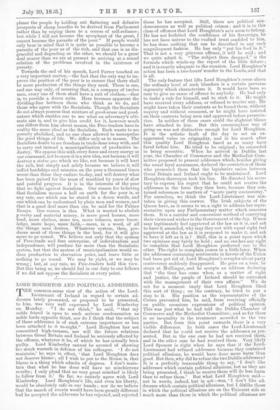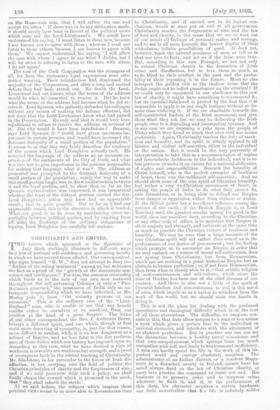LORD HOUGHTON AND POLITICAL ADDRESSES. T HE common-sense view of the
action of the Lord- Lieutenant of Ireland in regard to certain ad- dresses lately presented, or proposed to be presented, to him, was very well expressed by Lord Kimberley on Monday. " I do not think," he said, " that my noble friend is open to such serious condemnation as noble lords opposite think, nor do I think that the subject of these addresses is of such extreme importance as has been attached to it to-night." Lord Houghton has not committed high-treason, nor will the future relations between Great Britain and Ireland be seriously affected by the offence, whatever it be, of which he has actually been guilty. Lord Kimberley cannot be accused of showing to much warmth in defence of his colleague. I do not maintain,' he says in effect, that Lord Houghton does not deserve blame ; all I wish to put to the House is, that blame is a thing which admits of degrees. I don't main- tain that what he has done will have no mischievous results ; I only plead that no very great mischief is likely to follow from it.' So far, we entirely agree with Lord Kimberley. Lord Houghton's life, and even his liberty, would be absolutely safe in our hands ; nor do we believe that the march of events would have been greatly different had he accepted the addresses he has rejected, and rejected those he has accepted. Still, there are political mis- demeanours as well as political crimes ; and it is to this class of offences that Lord. Houghton's acts seem to belong. He has not forfeited the confidence of his Sovereign, he has not been untrue to the exalted trust confided to him, he has done nothing that can be described in any such magniloquent fashion. He has only "put his foot in it." That is not a very grievous offence, it will be said ; and we quite admit it. "The subject then dropped," is the formula which winds-up the report of the little debate ; and it is exactly adequate to the occasion. Lord Houghton's action has been a two-hours' wonder in the Lords, and that is all.
The only feature that lifts Lord Houghton's error above the ordinary level of such blunders is a certain perverse ingenuity which characterises it. It would have been so easy to give no cause of offence to anybody. He bad only- to make a rule for himself, and to stick to it. He might have received every address, or refused to receive any. He might have taken their contents as he found them, without inquiry and without comment, or he might have insisted on their contents being seen and approved before presenta- tion. In neither of these cases could the slightest blame have attached to him. But this commonplace way of going on was not distinctive enough for Lord Houghton. It is the artistic fault of the day to set an ex- aggerated value on originality, and in his search after this quality Lord Houghton fared as so many have fared before him. He tried to be original ; he succeeded in being eccentric. When he arrived in Dublin last year, the Chamber of Commerce and the Methodist Com- mittee proposed to present addresses which, besides giving the usual loyal assurances, declared the conviction of those who presented them that the legislative union between Great Britain and Ireland ought to be maintained. Lord Houghton thereupon took his line. He directed his secre- tary to express his regret that he could not receive the addresses in the form they then bore, because they con- tained references to matters of " acute party controversy." For ourselves, we think the Lord-Lieutenant was mis- taken in giving this answer. The Irish subjects of the Queen have, as it seems to us, a right to address her repre- sentative upon any Parliamentary matter which concerns them. It is a natural and convenient method of conveying their views and wishes to the Government of the day. If men may legitimately feel aggrieved at the law as it is, and ask to have it amended, why may they not with equal right feel aggrieved at the law as it is proposed to make it, and ask to have it left as it is P Still, this is a point upon which two opinions may fairly be held ; and no one has any right to complain that Lord Houghton preferred one to the other. The right to complain comes in a little later. When the addresses containing sentiments in favour of the Union had been got rid of, Lord Houghton's scruples about party controversy suddenly disappeared. He goes on a tour, he stops at Mullingar, and he accepts an address declaring that " the time has come when, as a matter of right and justice, the people of Ireland should be entrusted with the management of their own affairs." We do not for a. moment imply that Lord Houghton liked this sort of thing ; on the contrary, he tried to put a stop to it. His position as the representative of the Crown prevented him, he said, from receiving officially on public occasions expressions of political opinion. This was just what he had told. the Dublin Chamber of Commerce and the Methodist Committee; and so far there is no inequality in the treatment accorded to the two parties. But from this point onwards there is a very visible difference. In both cases the Lord-Lieutenant declared that he (Quid not receive the addresses as pre- sented. But in the one case he had not received them, and in the other case he had received them. "Very likely Lord Spencer is right when he says that if the Lord- Lieutenant had refused addresses because they contained political allusions, he would have done more harm than good. But then, why did he refuse the twoDublin addresses It is a perfectly reasonable thing to say, I don't like addresses which contain political allusions, but as they are being presented, I think to receive them will do less harm than to refuse them.' But what Lord Houghton said— not in words, indeed, but in act—was, I don't like ad- dresses which contain political allusions, but I dislike those in which the political allusions are on the Unionist side so much more than those in which the political allusions are ' on the Home-rule side, that I will refuse the one and accept the other.' If there was to be any distinction made, it should surely have been in favour of the political views which were not the Lord-Lieutenant's. We could have understood his saying, ' I must listen to these men, because I am known not to agree with them ' • whereas I need not listen to those others, because I am known to agree with them.' We cannot understand his saying, I will allow the men with whom I agree to say what I dislike, but I will be strict in refusing to, listen to the men with whom I do not agree.'
The c ise of the Cork Corporation was the strangest of all, for here the customary loyal expressions were alto- gether wanting. Their introduction had displeased the majority of the Corporation, and after a, long and excited debate they had been struck out. No doubt the Lord- Lieutenant had not known what the terms of the address would be when he consented to receive it. But he knew what the terms of the address had become when he did re- ceive it. Lord Spencer, who gallantly defended his colleague without any means of making the defence effectual, did not deny that the Lord-Lieutenant knew what had passed in the Corporation. He only said that it would have been injudicious to refuse to receive the address on account of it. But why would it hare been injudicious ? Because, says Lord Spencer, it " would have given enormous im- portance to certain persons, and would have increased the dormant disloyalty of a small portion of the .population." It seems to us that this very fairly describes the tendency of the course which Lord Houghton actually took. He accepted the language of the address as an accurate ex- pression of the sentiments of the City of Cork, and what was this but to give importance to the persons responsible for making that language what it was ?, The address as presented was prompted by the dormant disloyalty of a small portion of, the population ; surely the way to make this small portion larger was to draw no distinction between it and the loyal portion, and to show that, so far as the Queen's representative was concerned, it was immaterial whether the loyal or the disloyal portion carried the day. Lord Houghton's action may have had no appreciable result ; that is quite possible. But so far as it had any appreciable result, this is the direction in which it tended. Whatever good is to be done by maintaining strict im- partiality between political parties, and by exacting from all alike the discharge of the ordinary obligations of loyalty, Lord Houghton has carefully left undone.



































 Previous page
Previous page